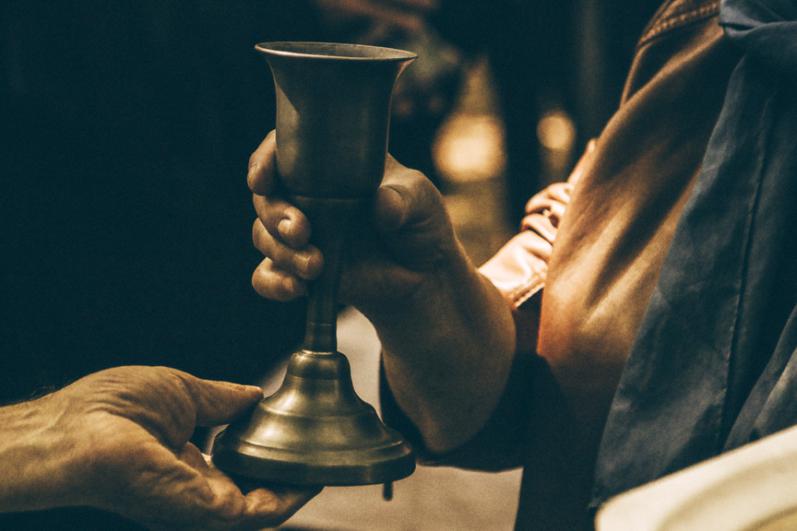The inheritance of Ordinary Time
In September, the Catholic University community gathered for our annual Mass of the Holy Spirit to mark the start of the new academic year. I prayed for my students and my colleagues -- and I hope that they prayed for me.
This year, a rare chalice from 15th-century Ireland was used in our celebration of the Eucharist. That the chalice survived all these years is an historical mystery that intrigues me.
It is also a reminder to me of how much I owe my ancestors in faith.
Sometime long ago, before Columbus sailed, before Galileo or Shakespeare were born, before St. Peter's Basilica was built, before the Reformation and the Renaissance, people I will never know celebrated Mass with this same chalice. What the chalice held -- both then and now -- is far more precious than the silver-gilt cup. Yet, it was a reminder to me that the faith I cherish today is one I share with 20 centuries of those who came before me and left this great inheritance to me.
The gift of that faith was nurtured through the years by generations of those whose faith was their greatest treasure. They shared it with those with whom they walked through this life. They also preserved it for those who would come after them.
They built the churches -- both grand and simple -- where we still worship today. They wrote the books and thought the great thoughts that reverberate through the ages with deeper insights about God. They led saintly lives that continue to inspire us through the ages. At their best, they built societies and infused them with the institutions and traditions that point to the good, true, and beautiful. They wrote the music, molded the sculptures, and breathed life into canvas as they gave us the artwork that tried to capture a bit of the divine. They were willing to suffer much for their faith in times of trouble and brought to life enduring traditions for celebrating joy.
They devoted themselves to religious life and in their vocations built the parishes and schools that bring God to His people, and people to their God. They made sure that the sacraments would continue to be celebrated through the centuries under the most dangerous, even deadly, conditions. They established great universities, founded renowned hospitals, and built the largest private network for material assistance that the world has ever known.
When I think of the ancient chalice that my unknown ancestors in faith used at their celebration of Mass, I cannot help thinking about all of these great things done through the centuries to be sure that faith was handed down through the generations.
I also cannot help but think of all the ordinary unknown people who also ensured, in quiet simple ways, that faith -- strong and fragile -- was handed down through the generations.
When a grandfather teaches his grandchildren his favorite hymns, he does that. When a grandmother says evening prayers with her grandchildren, and a godparent prays for a godchild, they do that. When a priest in a parish in a far corner of the globe witnesses a marriage and offers wisdom for building a faith-filled home, he does that. When a religious sister in an impoverished school listens to a fearful child and offers him comfort, she does that. When an older sibling corrals younger siblings in a pew at Mass and does his best to draw their attention to the sacred, he does that. When parents give their children the example of a holy life well-lived, they do that.
When ancient people unknown to me celebrated Mass with a chalice that, like their faith, endures through the ages, they did that too.
Much is said today about how the current generation is the generation of "nones" who claim no connection to a religious tradition. I hope that they do not remain that way. I hope that my generation does all we can to pass along the gift of faith through our word, deed, example, prayers, and love. I hope that centuries from now, our descendants in faith will be grateful that we handed it down to them in all the ways we are called to do so. If we do, we will have left them the greatest inheritance of ordinary time.



















